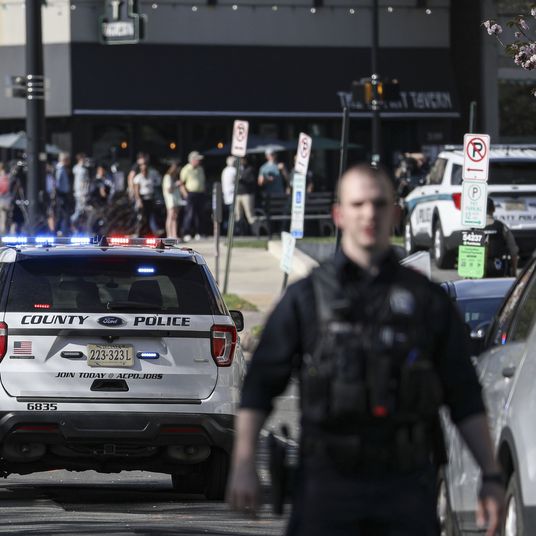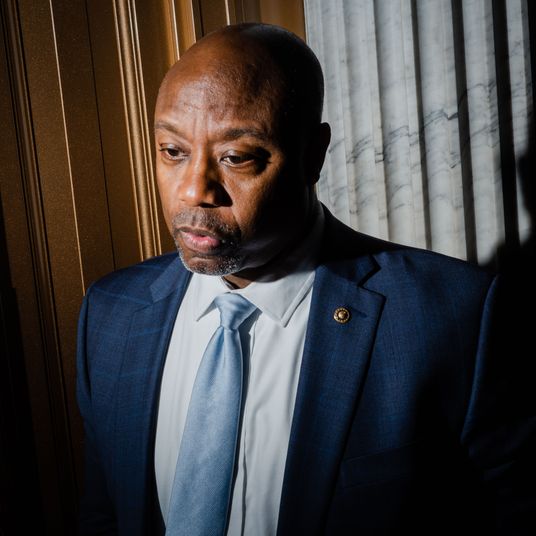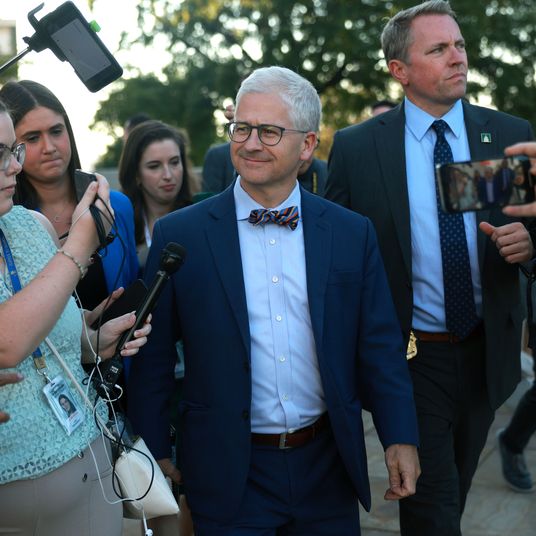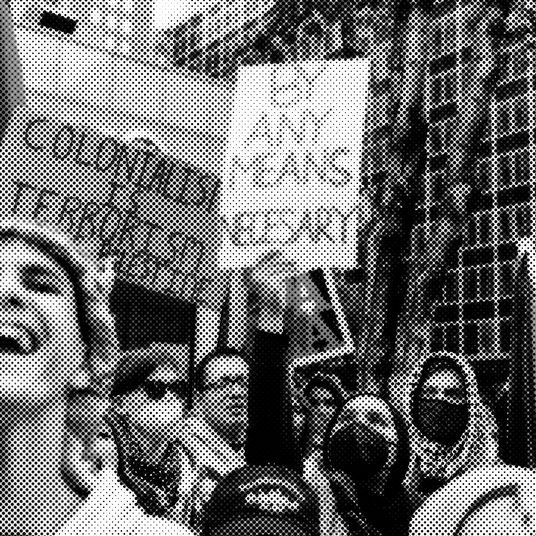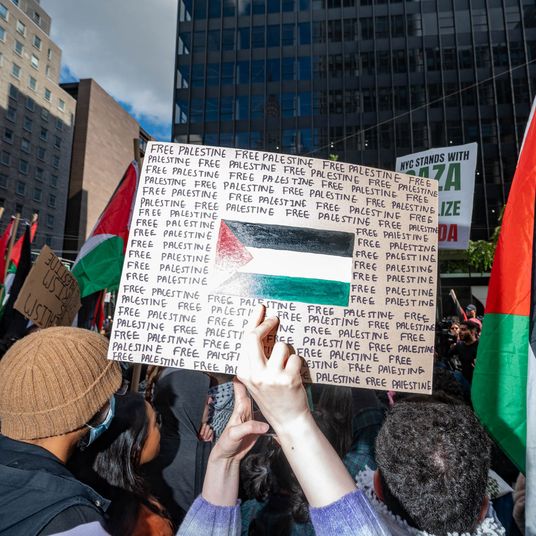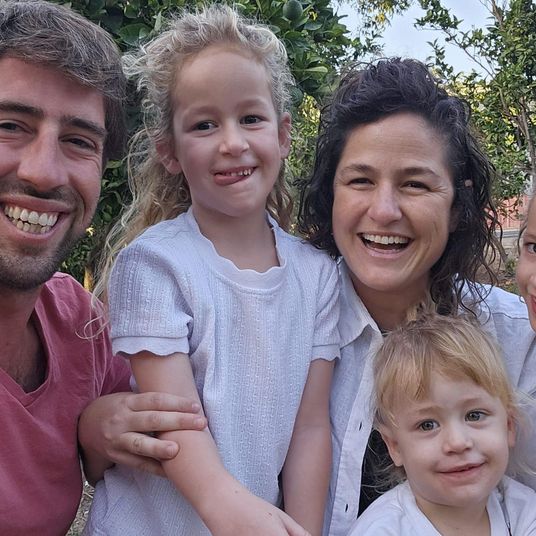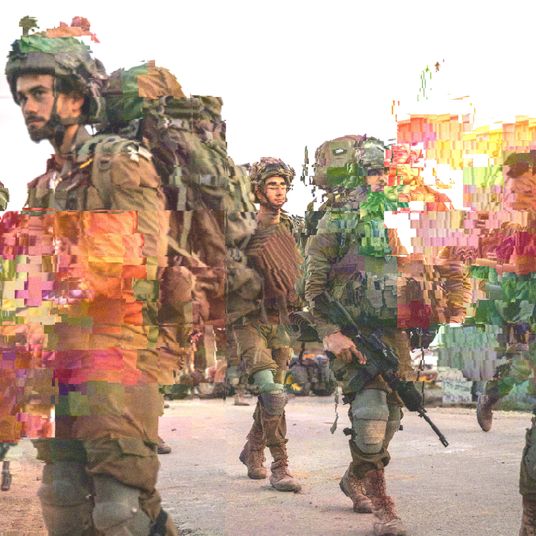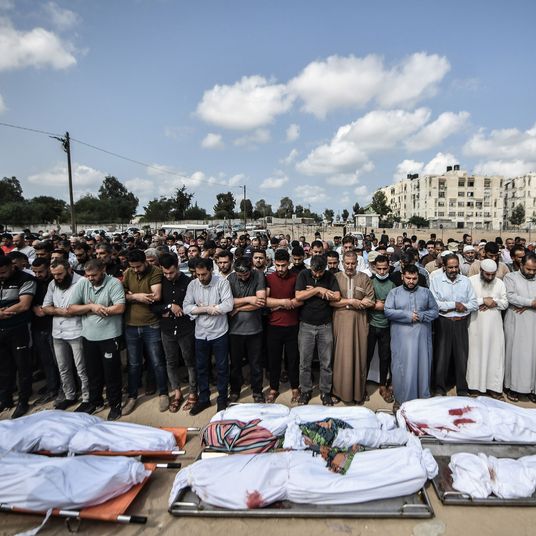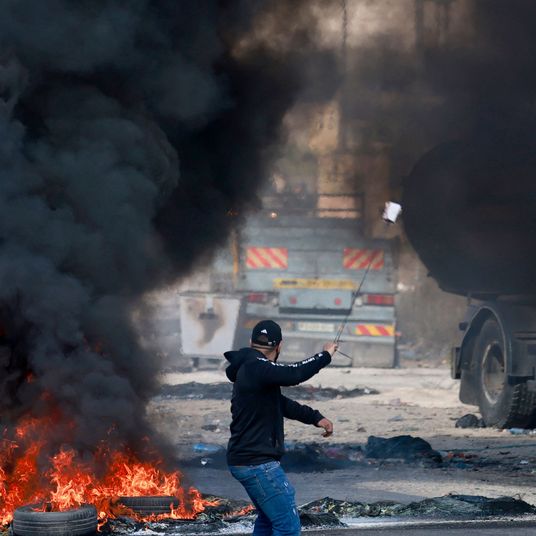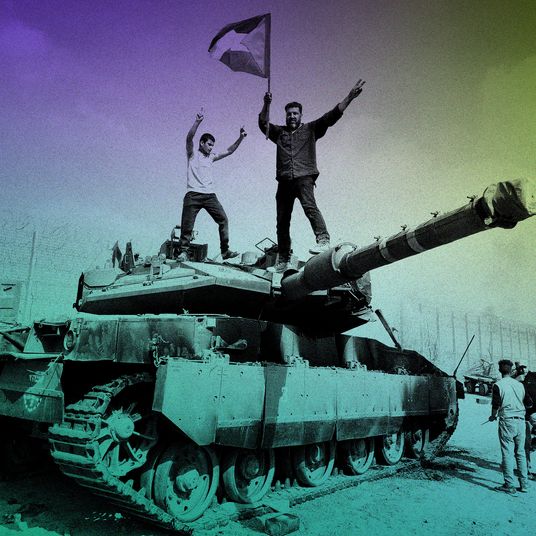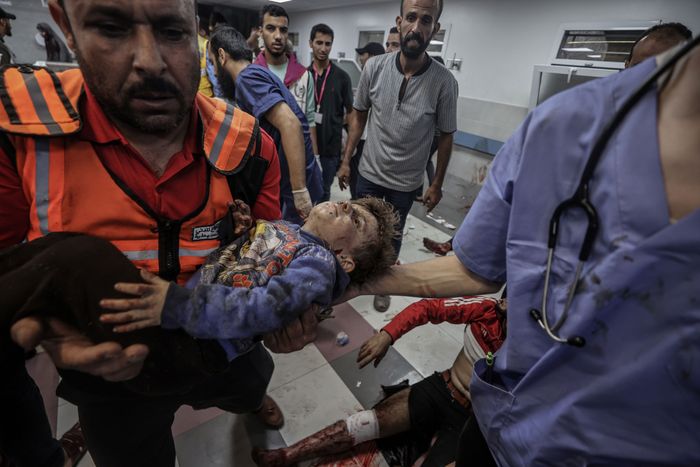
Eleven days after Hamas militants killed more than 1,400 people during a horrifying incursion into Israel, the Israeli military’s ground invasion of Gaza continues to loom as the humanitarian crisis in Gaza gets more and more dire. Israel has continued its relentless air strikes in the Gaza Strip, where health authorities say well over 3,000 people have already been killed. Palestinian civilians have fled the north ahead of the invasion, but that has overwhelmed communities in southern Gaza, where Israel is also conducting air strikes. Everything got much worse on Tuesday night when an explosion at the al-Ahli Arab Hospital in Gaza City reportedly killed hundreds of people. Below are live updates, including the latest news and commentary from across the web, on this unprecedented conflict as it develops.
Biden says U.S. is investigating hospital explosion, but it may not matter
“I am outraged and deeply saddened by the explosion at the hospital in Gaza, and the terrible loss of life that resulted,” Biden, who is now en route to Israel, said in the statement. “Immediately upon hearing this news, I have directed my national security team to continue gathering information about what exactly happened.”
“The United States stands unequivocally for the protection of civilian life during conflict and we mourn the patients, medical staff, and other innocents killed or wounded in this tragedy,” he continued.
Regardless of what additional evidence is brought forward regarding the hospital blast by the time Biden lands in Israel, his ability to exert influence in the crisis has undoubtedly been diminished, as Haaretz writer Anshel Pfeffer points out:
‘The region is now boiling’
In a thread on Twitter, The Economist’s Middle East correspondent Gregg Carlstrom shares some initial thoughts on the broad consequences of Tuesday night’s horror at al-Ahli Arab Hospital:
Israel’s room for maneuver on a ground invasion has just shrunk dramatically. Not just because it has lost a good deal of international support, but because the region is now boiling.
We’ve seen protests in the West Bank against Abbas (who is historically unpopular to begin with), protests in Jordan, crowds gathering outside the American embassy in Lebanon. And the risk of Iranian-backed groups opening other fronts has probably risen markedly. Everyone in the region is joining the condemnation. Here is the UAE, for example, Israel’s most reliable partner in the Arab world over the past few years, explicitly blaming Israel for the attack on Ahli hospital and calling for an immediate ceasefire.
The White House was already concerned that Israel was embarking on a long, ruinous war without an exit strategy, and that it risked dragging the region into a broader conflict. Both of those concerns have no doubt been amplified over the past few hours. Balanced against all of this is an Israeli public primed for a major war and an Israeli leadership that will not want to appear weak. But the political window for a ground offensive was already shrinking after repeated delays, and the geopolitical calculus has just changed a lot.
Anti-Israel protests spring up across the Middle East and North Africa
There were demonstrations against Israel and in favor of Palestinians in multiple countries following the hospital explosion, including Jordan — where protesters attempted to storm the Israeli embassy in Amman — as well as Lebanon, Iraq, Turkey, Syria, and Iran. There were also protests across the West Bank, in Ramallah, Hebron, Jenin, and other cities.
Jordan cancels summit with Biden
The al-Ahli Arab Hospital blast is clearly going to have a serious impact on diplomatic efforts to bring together powers in the region in search of some solution to the crisis in Gaza.
Videos suggest hospital explosion was caused by misfired rocket
This appears to be the best video yet available of the events preceding the blast, but it’s still not clear what caused the midair explosion:
Another OSINT outfit has come to the same conclusion, offering a thread of analysis to back it up:
Hamas claims it will release all its civilian hostages if Israel stops bombing Gaza
Per NBC News’s report, which came out around the same time news of the hospital blast began to emerge:
A senior Hamas official told NBC News’ Richard Engel that the group is willing to immediately release all civilian hostages — foreign and Israeli — if Israel stops its airstrikes on Gaza.
The Hamas official said the hostages could be released within the hour as long as Israel meets its terms. He claimed that there is no safe place to release the hostages now. In exchange for the release of Israeli soldiers held hostage, the Hamas official said Israel must release all Palestinians held in Israeli jails.
Israel’s Twitter account publicizes, then removes purported video evidence of failed rocket
Adding to the confusion over who was responsible for the devastating blast at al-Ahli Arab Hospital, Israel’s official Twitter account published a tweet claiming a militant rocket caused the explosion that included video footage of a barrage of rockets fired from Gaza City on Tuesday night. It then edited the tweet and deleted the video, which had a timestamp at least 40 minutes after the first reports of the blast. While this doesn’t mean Israel’s claims about the explosion are false, if it was just a mistake, it is a baffling one.
Hundreds dead after blast at Gaza City hospital; Israel denies blame
An explosion at al-Ahli Arab Hospital in Gaza City on Tuesday night has killed at least 500 people according to the Gaza Health Ministry (which is run by Hamas). Purported video footage of the aftermath shows scores of dead and wounded civilians.
Almost immediately, Hamas and Israel traded accusations that the other was responsible for the blast. Hamas said an Israeli air strike was to blame, while the Israeli military claimed a “failed Islamic Jihad rocket,” referring to a Hamas-aligned militant group in the Gaza Strip, caused the explosion. Either way, it’s the single deadliest incident in Gaza since the wars began between Hamas and Israel in 2008.
Photos from al-Ahli Hospital showed fire engulfing the hospital halls, shattered glass and body parts scattered across the area. The ministry said at least 500 people had been killed. Several hospitals in Gaza City have become refuges for hundreds of people, hoping they would be spared bombardment after Israel ordered all residents of the city and surrounding areas to evacuate to the southern Gaza Strip.
The IDF has officially denied responsibility for the blast:
Earlier, an IDF spokesperson also denied that Israel would target such a “highly sensitive building”:
A hospital is a highly sensitive building and not an IDF Target. The IDF is currently investigating and as always prioritizes accuracy. We urge everyone to proceed with caution while reporting about a terror organization.
Previous reports suggested thousands of people may have been taking shelter at the hospital.
Abbas drops out of Biden meeting following hospital blast
Egypt’s Foreign Ministry also condemned the incident, calling it “a deliberate strike against civilian targets” that is “in violation of international humanitarian law and the most basic values of humanity.”
IDF says it has not committed to ground invasion
“Everyone is talking about a ground offensive — it might be something different,” Israel Defense Forces spokesman Richard Hecht said Tuesday.
The IDF previously said it was planning a large-scale operation, and in particular a massive ground offensive, but while Israeli air strikes on Gaza have continued, reports suggest the invasion has been delayed. For now, it is unlikely that Israel will launch its major offensive into northern Gaza before or during President Biden’s visit to the country, scheduled for Wednesday.
Brussels terrorist attack linked to Israel-Hamas war
A suspected terrorist who murdered two Swedish football fans in Brussels on Monday night was killed by police after an overnight manhunt. Local authorities have linked the attack to the ongoing crisis in Israel and Gaza. Politico Europe reports:
In a press conference at 5 a.m. Tuesday morning, Belgian Prime Minister Alexander De Croo said the suspect was “a man of Tunisian origin” who “was staying illegally in our country.”
De Croo said the shooter “targeted specifically Swedish football supporters,” and that a full investigation into the “brutal terrorist attack” is underway. Eric Van Der Sypt, a spokesperson of the federal prosecutor office told public broadcaster VRT, on Tuesday: “We’ve said initially that there would not be a link with the events in Gaza, but we have determined in the meantime that he shared a couple of support messages for the Palestinian people on his social media,” in reference to the ongoing Israel-Hamas war.
Sweden has been on the front line of blowback from hard-line Islamists, due to repeated Quran burnings — including a spate this summer which led Stockholm to increase the country’s security threat level.
It was the second suspected terrorist attack in Europe since the Israel-Hamas war began. On Friday in northern France near the Belgian border, a knife-wielding 20-year-old Russian immigrant attacked a school and killed a teacher and injured three other adults. French authorities believe it was an Islamist terror attack, and France’s interior minister said in an interview that it was “probably” linked to the events in Israel and Gaza.
Biden will travel to Israel on Wednesday
Blinken, who met for several hours with Netanyahu and other Israeli officials overnight Monday, also said Israel and the U.S. would come up with a plan to deliver humanitarian aid to Gaza — though it’s not at all clear how or when that will come together.
Israeli forensics teams recount horrors of identifying the dead
The AFP’s Patrick Anidjar visited two of the five sites in Israel where doctors, geneticists, and other forensics experts have been working to identify the bodies of hundreds of people killed during Hamas’s October 7 attack. Numerous bodies are burned beyond recognition:
[National Center of Forensic Medicine director Hen] Kugel pointed at a tangle of bones and shreds of flesh held together by an electrical cable that was caked in molten plastic.
“On the scanner,” he explained, “we clearly see two spinal columns. That of a man or a woman, and that of a child.
“The posture of the two bodies shows that the adult tried to protect the child. They were tied up then burned alive.”
As he spoke, more bodies were being unloaded from a truck, with other vehicles waiting in the car park outside.
At another facility at the Shura military base near Ramla, workers said they had seen evidence of multiple atrocities:
[Rabbi Israel Weiss, a volunteer team leader at the site,] and other staff said there were signs that many of the victims had been tortured or raped.
“Never in my life have I seen the horrors that lie behind us today,” he said. “I have seen babies, women and men beheaded. I have seen a pregnant woman with her belly torn open and the baby cut out.”
“A lot of the women who were brought here were raped.”
Senior Staff Sergeant Avigayil, who gave only a first name, told reporters there were indications some of the bodies had been booby-trapped.
Iran reiterates warning of multi-front war
The New York Times Farnaz Fassihi reports:
Iran’s foreign minister, Hossein Amir Abdollahian, warned that multiple fronts would open against Israel from the so-called resistance axis — meaning militia backed and supported by Iran, including Hezbollah in Lebanon — if Israel did not stop what he characterized as attacks on civilians in Gaza. Speaking in an interview on state television, Amir Abdollahian said that “any preemptive action in the next few hours is possible” from regional militia. Asked if Iran would enter the war, he said that “anything is possible, no side can remain indifferent.”
Hamas releases video footage of 21-year-old hostage
The propaganda video shows Mia Schem, a Franco-Israeli woman taken captive during Hamas’s attack on the Supernova music festival, appearing to receive medical treatment for an injury to her arm. Schem also addresses the camera at one point, claiming she is being treated well and asking her captors to let her return home. A New York Times analysis of the video reveals that at least some of the footage was at least six days old.
Gaza-Egypt border crossing still hasn’t been opened
The Rafah border crossing remained closed again on Monday, stranding humanitarian aid in Egypt, and Gazans and foreigners, including Americans, who have gathered on the Gaza side hoping to leave. The U.S. has repeatedly tried to negotiate the opening of the border, but those efforts have not yet proved successful. Multiple Israeli air strikes have been conducted near the crossing since October 7, which authorities in both Egypt and Gaza have blamed for at least some of the delay reopening, but there are conflicting reports about what is actually going on.
Nearly 200 hostages
Israel said Monday that at least 199 people were abducted by Hamas during its October 7 incursion. It had estimated it was at least 155 people as of Sunday.
Water without power
Per the BBC, it remains unclear just how much water service has been restored to southern Gaza, particularly since water pumps require electricity:
Water is now “running out” in Gaza, Jason Lee of Save the Children told the BBC this morning from Ramallah in the West Bank. He said the aid agency had had reports that the water was flowing in parts of southern Gaza again, but that without fuel or electricity to pump it, it would not be available to the general population. The UN Palestinian refugee agency UNRWA told the BBC on Monday that the 6,000 displaced people at its Rafah logistics base were down to one litre of water per person per day.
Biden says reoccupation of Gaza would be a mistake
In a 60 Minutes interview that aired on Sunday night, President Joe Biden reiterated his steadfast support for Israel in its war with Hamas, which he likened to “sheer evil” and said he agreed needed to be eliminated entirely. But he also warned that it would be a “big mistake” for Israel to try to reoccupy Gaza and insisted that “there needs to be a Palestinian Authority. There needs to be a path to a Palestinian state.”
The president said he supported the establishment of a humanitarian corridor for Gazan refugees, that he was “confident” Israel would follow the rules of war, and that “there’s going to be an ability for the innocents in Gaza to be able to have access to medicine and food and water.”
He also reiterated that the U.S. has found no direct link between Hamas’s October 7 attack and Iran. The New York Times reported Friday that Iranian and Hezbollah officials helped plan the attack, according to somewhat conflicting accounts from people familiar with the operation, but “the United States, Israel, and key regional allies have said they have not found evidence in early intelligence gathering that Iran directly helped plan the attack” and the U.S. “has collected multiple pieces of intelligence that show that key Iranian leaders were surprised by it.”
Biden additionally sort of brushed off the question of whether the U.S. could handle supporting two allies — Ukraine and Israel — that are each fighting wars:
Who targeted civilians fleeing northern Gaza on a key evacuation route?
Soon after Israel told a million people to flee northern Gaza Friday, multiple explosions struck an apparent civilian convoy that was traveling south on one of the main evacuation routes, killing at least a dozen people. Hamas said 70 were killed and quickly blamed Israel for the attack. The IDF blamed Hamas, alleging the militant group, which has told Gazans to ignore Israel’s evacuation order, had booby-trapped the road. The Financial Times partnered with the conflict-monitoring group Airwars to take a close look at videos shared online from the scene and concluded that “analysis of the video footage rules out most explanations aside from an Israeli strike.”
The analysis confirmed that at least 12 civilians were killed by the blasts, and British weapons and munitions expert Chris Cobb-Smith said that “while it was hard to draw a definitive conclusion, the available evidence suggested the most likely cause of the blast was a missile strike.” Cobb-Smith explained that both the apparent injuries victims suffered, as well as the visible blast damage, supported that conclusion.
Israel has also been blamed for another blast on Friday that struck a nearby bridge on the same road in Gaza, Salah-ad-Din, but analysis of video footage of that explosion suggests it was not caused by an air strike but by a car bomb or IED:
In other words, while there isn’t definitive evidence regarding who was behind either attack, it seems entirely possible that both the Israeli military and Hamas targeted the same evacuation route, separately, on Friday.
Illinois police say gruesome murder of Palestinian American boy was a hate crime
A 71-year-old man in Plainfield Township, Illinois, who attacked his Palestinian American tenant and her 6-year-old son with a knife on Saturday morning — killing the boy — allegedly targeted them over their Muslim faith and because he was upset about the news in Israel, according to local police. NBC Chicago reports:
Joseph Czuba, 71, was charged with first-degree murder, attempted first-degree murder, aggravated battery with a deadly weapon and two counts of a hate crime, the Will County Sheriff’s Office said in a news release on Sunday.
At around 11:38 a.m. on Saturday, deputies with the sheriff’s office were called to a home in the 16200 block of South Lincoln Highway near Lily Cache Road regarding a stabbing involving Czuba and a renter, according to authorities. The renter, a 32-year-old woman, sustained over a dozen stab wounds to her body and was expected to survive the attack. Czuba also allegedly stabbed the woman’s son, who was initially transported to the hospital in critical condition, but later died from his injuries, according to the sheriff’s office. An autopsy conducted by a forensic pathologist on Sunday revealed that the boy had been stabbed 26 times throughout his body, authorities stated.
The sheriff’s office said that “detectives were able to determine that both victims in this brutal attack were targeted by the suspect due to them being Muslim and the ongoing Middle Eastern conflict involving Hamas and the Israelis.”
The Chicago office of the Council on American-Islamic Relations has identified the victims as Hanaan Shahin, who has lived in the U.S. for 12 years, and her son, Wadea Al-Fayoume, who was born here and just celebrated his birthday on October 6. CAIR-Chicago said that the family “had lived on the ground floor of the house for two years with no previous notable issues with the landlord”:
According to written text messages reportedly sent to the father of the boy by the mother from the hospital and shared with CAIR-Chicago, the landlord who had been angry with what he was seeing in the news knocked on their door, and when she opened, he tried to choke her and proceeded to attack her with a knife, yelling “you Muslims must die!” When she ran into the bathroom to call 911, she came out to find that he had stabbed her six-year-old son to death. “It all happened in seconds,” she texted.
More first-person accounts of the horrors of the Supernova music festival massacre
The New York Times and Rolling Stone have both published new reports that offer broad accounts of the October 7 attack by Hamas militants on partygoers at the Supernova outdoor psytrance festival in southern Israel. At least 260 people were murdered and an unknown number taken hostage. Per Rolling Stone:
As attendees drove out by way of the dirt roads to the north and south, they encountered Hamas fighters armed with guns on the road. Other Hamas militants flew in on motorized paragliders, striking the ground and opening fire, [artist manager Chen] Mizrachi says. When the traffic began bottle-necking, Hamas, which blockaded the two roads in and out of the festival, started firing into cars along those routes. “After a few minutes, we saw cars with broken windows and started to hear the shooting of guns,” says [attendee Nir Jorno,] who was attempting to drive out. After running back toward festival security, Jorno saw insurgents shooting women and a person in a wheelchair.
“People were panicking,” [attendee Yoni] Diller tells Rolling Stone. “Suddenly we see this car bumping into another car very slowly. The door opens, and we see a wounded girl. Someone shot her in the leg, and her whole left knee was disconnected from her body. She couldn’t brake. Her knee was shot. We tried to help her [and] give her water. She was dying in front of our eyes.”
By 8:00, the Hamas soldiers blockading the roads started hunting down music fans gathered in nearby bomb shelters, the Wall Street Journal reported. “We called the Army [over a radio] to let them know we were in the security station, stuck,” Mizrachi says. “We asked, ‘Where are you?’” But Hamas had intercepted the transmission. “We are on the way for you,” a voice told Mizrachi in an Arabic dialect. Upon fleeing, Mizrachi felt a sense of hope when he spotted an Israeli policeman stopping a car. He soon realized that it was a Hamas fighter who had stolen a uniform.
One couple who survived, Bar and Lior Matzner, told the Times that they felt so abandoned during and after the attack that they aren’t sure they want to live in Israel anymore:
“We just needed to get away from the stress of work, the stress around security, to experience a moment of freedom,” [Bar] said. Instead, they found themselves in a field buried under dead leaves for hours, trying not to make a sound as the Hamas terrorists did their work. “My jaw was locked down,” she said, “even my teeth.” Mr. Matzner, 32, looked at his wife, 35, with tears in his eyes. “You lie down with your wife in a field, and you only know you must survive somehow to be with your kids,” he said. Now they are considering leaving Israel. “Right now, the country does not deserve that I and my children live here,” Ms. Matzner said. “We were abandoned, and we feel abandoned. I can’t smile. I can’t do anything.”
Israel says it has turned some of Gaza’s water back on
Israel announced on Sunday that it had resumed water service in part of southern Gaza, following pressure from the U.S. The Biden administration reportedly stressed to Israeli leaders that they could not order Palestinian civilians to evacuate to the south — which hundreds of thousands of people have already done — without also allowing access to water.
Aid workers said later Sunday that water had not been restored in much of southern Gaza.
Netanyahu finally meets with hostages’ families
An IDF spokesperson announced on Sunday that Hamas militants are holding about 155 people hostage. Hamas has claimed that some of those hostages have already been killed by Israeli air strikes.
The population of Gaza’s Khan Younis has doubled as refugees continue to arrive
The BBC’s Rushdi Abu Alouf reports on what he has seen in the city after he and his family fled there themselves:
Hundreds of thousands fled here from the north on whatever could carry them — cars if there was fuel, horse and cart if one could be found, their own feet if there was no other option.
And what they found was a city on its knees, ill-prepared for its population to literally double overnight. Every room, every alley, every street is packed with men, women and the young. And there is nowhere else to go. …
For many, the threat of Israel’s bombs and impending invasion - which comes after gunmen from Gaza killed 1,300 in Israel - cancels out Hamas’s order to stay put. But in this narrow strip of land, blockaded on all sides and cut off from the rest of the world, options for where one ends up are limited. Safety is never guaranteed. And so a teeming mass of Gazans, many already bombed out of their homes, all lost, all afraid, all knowing nothing of what comes next, converged here. This city, normally home to 400,000 people, has ballooned to more than a million overnight. As well as the north, they have come from the east, which suffered terribly in the 2014 war.
At least 12 journalists have already been killed amid the conflict
The Committee to Protect Journalists said Sunday that “in the first nine days of fighting, at least 12 journalists were killed, two were missing, and eight injured.” The dead include Reuters videographer Issam Abdallah, who was among a group of journalists struck by what appeared to be Israeli artillery fire while they were reporting on cross-border clashes near Al-Shaab in southern Lebanon on Friday. Six other journalists were also wounded in that attack.
Putting the toll in some context: Per the CPJ, 17 journalists have been killed in Ukraine since that war began nearly 20 months ago.
Hundreds of Americans trapped in Gaza still can’t get out, just like everyone else
“We have not been able to get American citizens through the [Gaza] border crossing and I’m not aware of anyone else being able to get out at this time, though I cannot fully confirm that because it’s a dynamic situation,” National Security Adviser Jake Sullivan said Sunday on Meet the Press. “We’re trying to create the circumstances where American citizens are in Gaza and are looking to lead to get into Egypt and ultimately to the United States or elsewhere, that they are able to do.”
As many as 600 Palestinian Americans are still in Gaza, and though the U.S. had announced that it had brokered a deal with Egypt to open the southern border for several hours on Saturday to allow U.S. citizens and other foreigners to leave — that never happened. Per the Washington Post:
Wael Abu Omar, the Palestinian spokesman for the Rafah crossing, said Palestinian officials had not had any communication with their counterparts on the Egyptian side. Egyptian media outlets reported that Cairo would only allow foreigners to cross the border if aid shipments could be delivered to Gaza.
Israel, meanwhile, has said it would strike any trucks coming across the border, especially trucks carrying fuel, according to a diplomatic official who, like others, spoke on the condition of anonymity because the official was not authorized to discuss sensitive negotiations.
The Wall Street Journal adds that “Egypt told the U.S. that it has too many evacuation requests to accommodate U.S. nationals and that it can’t grant passage to one country over others, according to two Egyptian officials, who also cited security concerns related to a lack of screening of individuals.”
There have also been reports that Hamas officials have turned away anyone attempting to leave through the Rafah border crossing. Hamas has instructed Gazans to ignore Israel’s evacuation orders, and the president of the group’s political bureau has publicly praised Egypt for blocking “immigration” from Gaza.
The U.S. has also been working to arrange transit out of Israel for any Americans who wish to leave. The White House announced last week that it was setting up charter flights out of the country. The U.S. Embassy in Israel also announced Sunday that a ship for Americans would leave Haifa on Monday morning bound for Cyprus. U.S. citizens who wish to use these options to evacuate from Israel will need to agree to repay the government for the cost.
At least 29 Americans were killed during Hamas’s attack on Israel last weekend, and another 15 U.S. citizens remain missing, the State Department said Saturday.
Israel is creating a larger buffer zone at border with Lebanon
Amid sporadic exchanges of fire with Hezbollah fighters over the border in Lebanon, the IDF said Sunday that it was creating a buffer zone as much as four kilometers wide on its side of the border. Civilians are now barred from entering the zone, and anyone living in villages within the zone will need to remain in shelters.
Death toll in Gaza surpasses 2014 war
At least 2,329 people have been killed in Gaza, including hundreds of children, since Israel began air strikes following Hamas’s October 7 attack, the Gaza Health Ministry said Sunday. That means that in a little more than a week, the death toll has already surpassed the number of Palestinians killed in the more-than-six-week war in 2014. Staff in Gaza’s hospitals say they continue to be overwhelmed with casualties from the air strikes and are short on medical supplies, and the United Nations says the hospitals will run out of generator fuel within days. Per the Associated Press:
In Nasser Hospital, in the southern town of Khan Younis, intensive care rooms are packed with wounded patients, most of them children under the age of 3. Hundreds of people with severe blast injuries have come to the hospital, where fuel is expected to run out by Monday, said Dr. Mohammed Qandeel, a consultant at the critical care complex. There are 35 patients in the ICU who require ventilators and another 60 on dialysis. If fuel runs out, “it means the whole health system will be shut down,” he said, as children moaned in pain in the background. “All these patients are in danger of death if the electricity is cut off.”
Dr. Hussam Abu Safiya, the head of pediatrics at the Kamal Adwan Hospital in northern Gaza, said it did not evacuate despite Israeli orders. There are seven newborns in the ICU hooked up to ventilators, he said. “We cannot evacuate, that would mean death for them and other patients under our care.” …
Shifa hospital in Gaza City, the territory’s largest, said it would bury 100 bodies in a mass grave as an emergency measure after its morgue overflowed, with relatives unable to bury their loved ones. Tens of thousands of people seeking safety have gathered in the hospital compound.
Invasion had been planned for this weekend, but was delayed
In a new report on Israel and Hamas’s plans for the looming ground offensive into northern Gaza and Gaza City, the New York Times notes that according to senior Israeli military officers, “The invasion was initially planned for the weekend, but was delayed by a few days at least in part because of weather conditions that would have made it harder for Israeli pilots and drone operators to provide ground forces with air cover.”
The Times also reports that:
To make it easier for its soldiers to operate, the Israeli military’s rules of engagement have been loosened to allow soldiers to make fewer checks before shooting at suspected enemies, the three Israeli officers said, without giving further details.
Israeli military officials have said that they intend to use the offensive to eliminate Hamas’s political and military leaders, but as the Times report makes clear, the invasion is going to be a bloody mess, and if and when it ends, there doesn’t seem to be much of a plan for how to handle the aftermath:
The operation risks locking Israel into months of bloody urban combat, both above ground and in a warren of tunnels — a fraught offensive that Israel has long avoided because it involves fighting in a narrow and tightly packed sliver of land populated by more than 2 million people. Israeli officials have warned that Hamas could kill Israeli hostages, use Palestinian noncombatants as human shields, and have strewn the territory with booby traps.
It remains uncertain what Israel will do with Gaza City, Hamas’s stronghold and the enclave’s largest urban center, if it captures it, or what exactly Israeli officials mean when they describe the destruction of Hamas’s leadership.
One officer also said that Israeli leaders haven’t yet decided whether or not they will also eventually try to retake control of southern Gaza — which is where the IDF told civilians in northern Gaza to evacuate to.
Did Iran threaten to intervene?
Axios reports that according to “two diplomatic sources with knowledge of the situation,” Iran sent Israel a message through the United Nations saying it would be forced to respond to the conflict if Israeli forces expand their offensive:
Iranian Foreign Minister Hossein Amir-Abdollahian met with UN envoy to the Middle East Tor Wennesland on Saturday in Beirut, the two diplomatic sources said. Wennesland urged Amir-Abdollahian to help prevent a spillover of the conflict in Gaza and Israel to the wider region in the Middle East.The Iranian foreign minister replied that Iran doesn’t want the conflict to turn into a regional war and wants to try and help with the release of civilians who are being held hostage by Hamas in Gaza. But Amir-Abdollahian stressed that Iran has its redlines. He said that if the Israeli military operation continues — and especially if Israel follows through on its promise of a ground offensive in Gaza — Iran will have to respond, according to the sources.
The report has not been confirmed elsewhere, and it’s not at all clear what such an intervention would or could even entail.
Israeli military says it’s preparing broad offensive, including ‘significant ground operations’
The IDF said in a statement on Saturday night that it had deployed forces across Israel and was preparing to “expand the attack” against Hamas, including what it said were a “wide range of offensive operative plans which include, among other things, an integrated and coordinated attack from the air, sea and land.” The attack will include “a significant ground operation,” the IDF also said.
Hamas militants were reportedly ordered to kill civilians
The Wall Street Journal reports that according to orders recovered from the bodies of militants killed during last weekend’s attack, gunning down scores of civilians and hostage-taking were all part of Hamas’s official plan:
A Hamas squad that attacked the farming community of Alumim in southern Israel, was directed to “achieve the highest level of human losses” and then take hostages, according to documents viewed by The Wall Street Journal and which an Israeli official said were authentic. Orders carried by militants sent to attack Sa’ad, a 670-person collective farming community, instructed them to “to take control of the kibbutz, kill as many individuals as possible, and capture hostages until receiving further instructions.” …
Israeli officials said they suspect that attackers who entered communities first tried to kill as many people as possible to limit the threat of a counterattack, then took hostage those who were still alive.
One striking similarity among the plans: Attackers were told to herd hostages into kibbutz dining halls before taking them back to Gaza, something that occurred in the town of Be’eri, where dozens of residents held in its dining facility were eventually rescued by Israeli troops.
Some Palestinians view Israeli evacuation order as another forced exodus
The Associated Press reports that many Palestinians believe the evacuation order is just another expulsion, like what happened during the 1948 Arab-Israeli War, when most Palestinians living in what is now Israel were forced to abandon their homes and flee — then never allowed to come back:
“You look at those pictures of people without cars, on donkeys, hungry and barefoot, getting out any way they can to go to the south,” said political analyst Talal Awkal, who has decided to stay in Gaza City because he doesn’t think the south will be any safer. “It is a catastrophe for Palestinians, it is a Nakba,” he said. “They are displacing an entire population from its homeland.” …
“The experience that happened with our families in 1948 taught us that if you leave, you will not return,” said Khader Dibs, who lives in the crowded Shuafat refugee camp on the outskirts of Jerusalem. “The Palestinian people are dying and the Gaza Strip is being wiped out.”
When is Israel going to invade Gaza?
On Friday, the Israeli military issued a 24-hour warning calling for the more than 1 million civilians in northern Gaza to “evacuate south for your own safety.” Following an unprecedented call-up of 300,000 reservists, Israeli forces have been massing at the border, and two Israeli officials told Politico on Friday that the country’s widely expected ground operation into Gaza is “imminent”:
The Israeli officials, who were granted anonymity to discuss sensitive military plans, said the evacuation order was issued to save as many Palestinian lives as possible ahead of the ground operation. The short window of time for that evacuation was necessary so that Hamas wouldn’t have much time to prepare, they said. …
It’s unclear whether most, or even many, of the Gazans ordered to leave their homes will be able to do so ahead of the ground invasion. Humanitarian aid groups say the timeline is too short and the conditions too challenging for such a large movement of people. Hamas is complicating the situation, urging residents to stay in their homes. And with Israel having cut off much of the electricity to the area, it’s difficult for electronic messages with instructions on how to evacuate to reach the intended audience.
‘The U.S. is giving Israel permission for war crimes’
Eric Levitz calls out the Biden administration for not doing enough to reign in its ally:
The U.S. government has done little to deter Israel from committing war crimes. It has declined to reject Israel’s evacuation order. “We’re going to be careful not to get into armchair-quarterbacking the tactics on the ground” of the Israel Defense Forces, National Security Council spokesman John Kirby said Friday. “What I can tell you is we understand what they’re trying to do. They’re trying to move civilians out of harm’s way and giving them fair warning.”
Meanwhile, the administration has forbidden State Department officials from releasing statements that call for “de-escalation/ceasefire,” an “end to violence/bloodshed,” or “restoring calm.” A White House spokesperson decried congressional progressives’ advocacy for a ceasefire as “repugnant” and “disgraceful.”
Late Friday, Fox News reported that the White House has encouraged Israel to delay its ground invasion until safe passage for Palestinian civilians out of northern Gaza can be secured. This is better than nothing. But it leaves Israel’s reckless siege and aerial bombardment campaign unchallenged.
This is a patent failure of moral leadership. The U.S. has the power to exert some influence over Israeli strategy. The primary cost of its acquiescence to Israeli war crimes will be the deaths of a grotesque number of innocent Gazans. A secondary cost will be a decline in America’s standing in the world in general and the Middle East in particular. It is not in America’s national interest to abet the mass killing of Palestinian civilians.
Read the rest of Eric’s post here.






